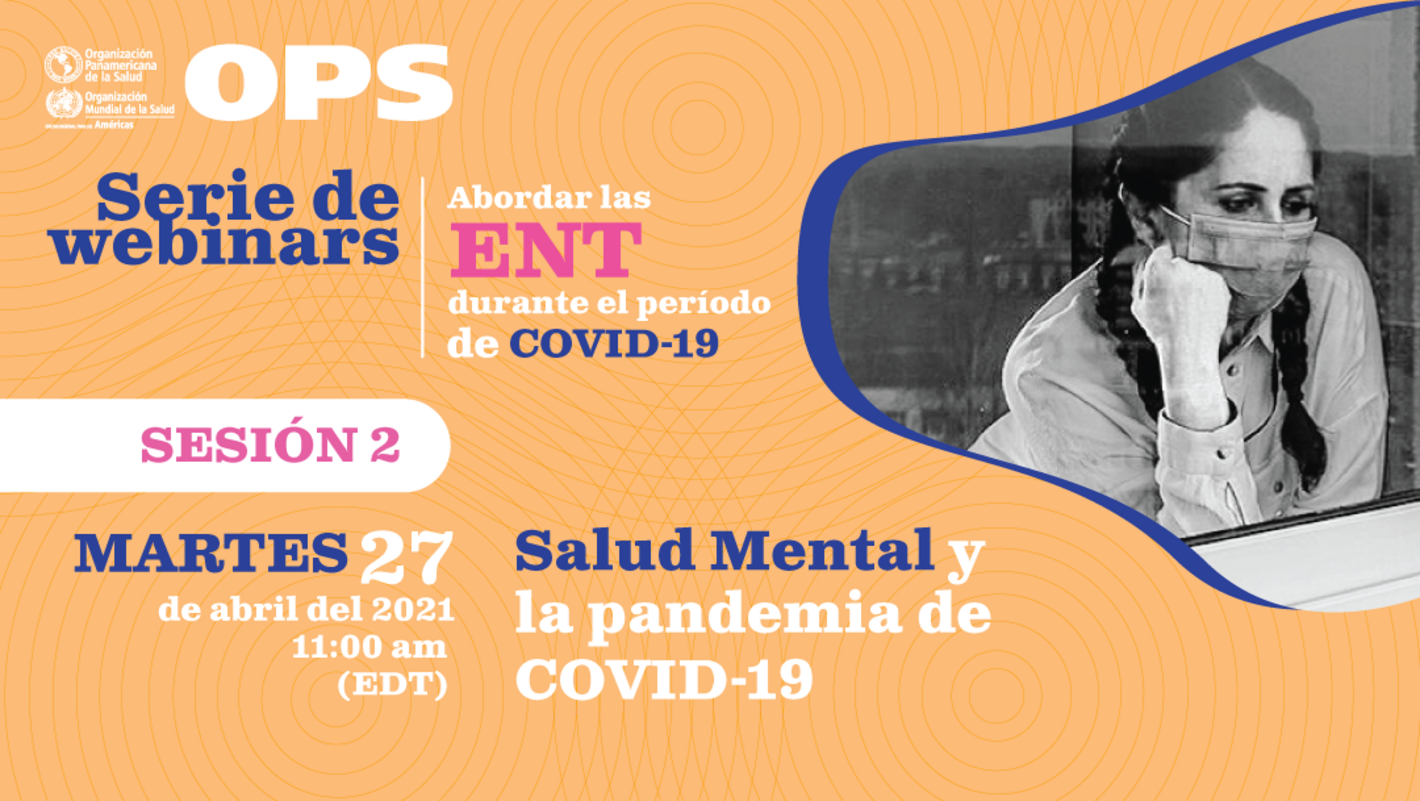
PAHO Webinar Series: Tackling Noncommunicable Diseases (NCDs), risk factors and mental health during the time of COVID-19
Background:
On 27 April 2021, from 11:00am to 12:30pm EST, the Mental Health and Substance Use Unit hosted a webinar on Mental Health and the COVID-19 Pandemic as part of PAHO’s Tackling NCDs, risk factors and mental health during the time of COVID-19 webinar series. The Zoom session, which featured simultaneous translation in English and Spanish, and interpretation in International Sign Language, was attended by 470 participants. It was additionally broadcast via YouTube.
Webinar Objectives:
- To present the impact of COVID-19 on the mental health of populations and mental health systems and services in the Region of the Americas during the pandemic and future plans for the post-pandemic period;
- To outline strategies and recommendations for working towards a multisectoral approach to MHPSS coordination and interventions and strengthening mental health systems in the Region of the Americas;
- To present countries' experiences in addressing mental health during the COVID-19 pandemic; and
- To advocate for the prioritization of mental health in the political agenda in the Region.
Webinar Presenters:
- Dr Anselm Hennis, Director, Department of Noncommunicable Diseases and Mental Health, PAHO
- The Honourable Dr. Terrence Deyalsingh, Minister of Health of Trinidad and Tobago
- Dr. Juana Herrera, Chief of the mental health section, General Directorate of Health Ministry, Panama
- Dr. Dévora Kestel, Director, Department of Mental Health and Substance Abuse, WHO
- Moderated by Dr. Renato Oliveira e Souza, Unit Chief, Mental Health and Substance Use, PAHO
Webinar Summary:
Dr. Anselm Hennis delivered the webinar’s opening remarks, which outlined the mental health situation prior to the COVID-19 pandemic and the pandemic’s impacts on the mental health of populations and mental health services in the Region of the Americas.
The Honourable Dr. Terrence Deyalsingh then presented on Trinidad and Tobago’s experience in responding to mental health during the COVID-19 pandemic. He identified the socioeconomic consequences of the pandemic on the country as well as opportunities it has presented for innovations in health care. To address the increasing demand for mental health and substance use services due to the pandemic, Trinidad and Tobago has worked with PAHO to establish a multi-sectoral mental health and psychosocial support (MHPSS) working group, develop an Action Plan, and operationalize the Plan within the strategic framework of the Intervention Pyramid for MHPSS in Emergencies. The Honourable Dr. Deyalsingh emphasized the importance of implementing holistic, whole-of-society approaches to mental health that focus on vulnerable groups.
Dr. Juana Herrera followed with a presentation on the experience of Panama. The country established a helpline to address mental health and included mental health services among the national health care services offered during the pandemic. Groups in need of greater mental health support, including migrants, people with disabilities, survivors of violence, and health and frontline workers are also receiving necessary mental health services. Dr. Herrera spoke on how Panama has integrated mental health into overall COVID-19 response efforts at the different levels of care, with the support of intersectoral coordination mechanisms including an intersectoral coordination network for mental health. The mental health situation during the pandemic has created an important opportunity for the country’s mental health sector to form alliances with many different actors, who have become involved in mental health communications and promotion activities. Dr. Herrera concluded her presentation by stressing the need to sustain progress made in mental health during the pandemic, which calls for greater investment in mental health.
Dr. Dévora Kestel spoke on the global impact of COVID-19 on mental health and current global initiatives. She presented data on mental health manifestations in the general population during the COVID-19 pandemic as well as the anticipated long-haul effects of the pandemic on mental health. Dr. Kestel shared the results of a WHO rapid assessment survey on mental, neurological, and substance use (MNS) services during the pandemic, which illustrate the significant disruption the pandemic has had on various types of MNS services worldwide. Dr. Kestel also highlighted advances at the global level to integrate mental health into the COVID-19 response and more generally into emergency responses; the UN’s policy brief “COVID-19 and the Need for Action on Mental Health” has advocated for mental health as a priority in the COVID-19 response, and the inclusion of the recent WHO Executive Board Decision “Promoting mental health preparedness and response for public health emergencies” at the upcoming 74th session of the World Health Assembly is an important next step towards meeting mental health needs during future public health emergencies.
Following a brief question and answer session, Dr. Hennis gave the closing remarks, highlighting key lessons learned from the presentations as well as recommendations for the future of mental health in the Region. He emphasized the need to ensure the availability and accessibility of mental health services in all communities, so that persons with mental health conditions can fully exercise their human rights.



